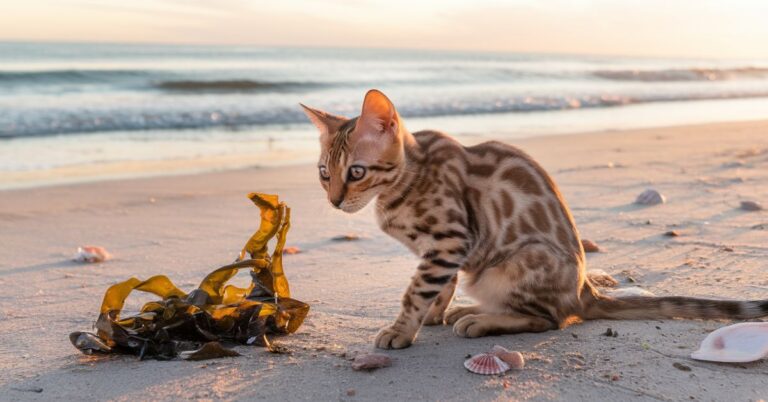Can cats eat coconut? Is Coconut Good or Bad for Your Cat?
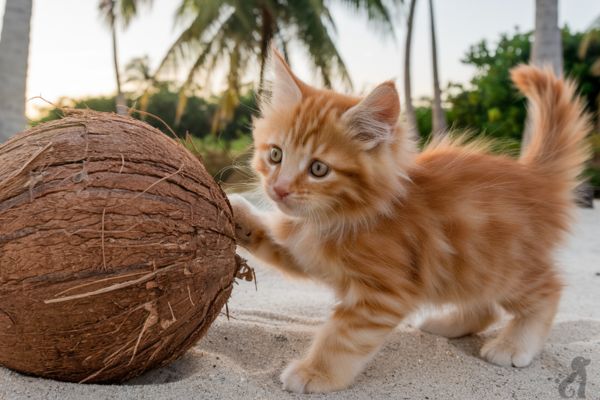
Have you ever wondered if cats can eat coconuts? While it’s common to see humans enjoying coconuts, it’s important to understand whether this tropical treat is safe for our feline friends.
In this article, you’ll discover everything you need to know about feeding coconuts to cats, including the benefits, risks, and safe practices.
Quick Overview
| Category | Details |
|---|---|
| Toxic | No |
| Commonly Allergenic | No |
| Species Appropriate | No |
| How Often to Feed | Occasional |
| How Much to Feed | Supplemental |
There are many forms of coconut that you can use, but not all of them may be beneficial for your cat. You should know in advance how your cat will react after eating coconut and be prepared to deal with the situation.
Can Cats Eat Coconut? Safe or Risky?
If you give your cat a coconut that is in its natural form, it will not harm the cat, but that does not mean that all coconut-related products are safe for cats.
If your cat’s vet has recommended a special diet, consult them before introducing coconut or any other new food. By the way, coconut is not toxic to cats, but we can’t call it a natural part of a cat’s diet either.
Cats often like to eat foods containing meat. Therefore, it is important to exercise caution when adding something like coconut to a cat’s diet. Some cat breeds may enjoy eating coconut, while others may ignore it completely.
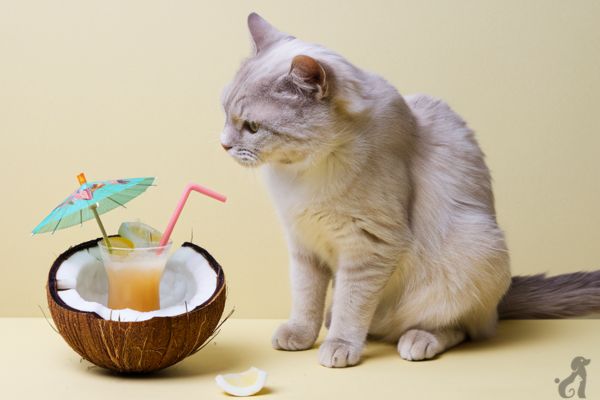
If you have a cat breed that eats coconut, then definitely give it coconut, but be careful about the quantity. Additionally, avoid giving coconut flesh and coconut oil to your cat, as they can cause digestive problems such as diarrhea, vomiting, and stomach upset.
If you give your cat coconut oil, it may experience stomach upset due to the high oil content. If your cat is experiencing health problems, it is better to give it coconut water in small quantities or not at all.
Coconut water has high amounts of electrolytes, mainly potassium, which can disturb the electrolyte balance and lead to health issues in cats with high potassium levels in their blood.
Some cats may avoid the ill effects of coconut when they consume small amounts. However, it is important to keep in mind that coconut is not an essential part of a cat’s diet, and you should avoid offering coconut to your cat daily.
Is coconut good for cats? Health Breakthrough
If you offer your cat coconut in moderation, it will not be toxic. But whenever you think about giving your cat coconut, it’s best to understand its benefits and risks first.
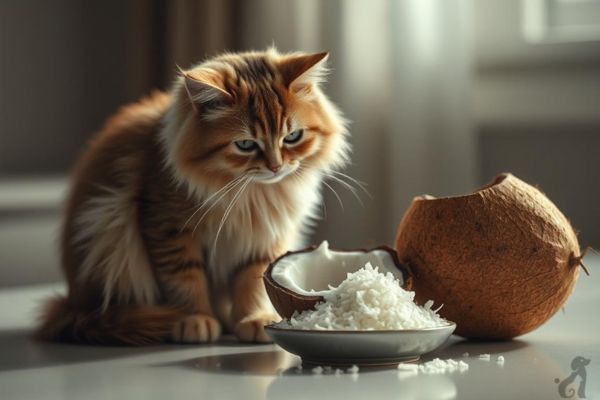
1. High Fat Content and Health Concerns:
Along with knowing the benefits of coconut, it is also important to understand that coconut is very high in fat. Therefore, we recommend not giving coconut to your cat regularly. If your cat consumes too much coconut, it may suffer from hyperlipidemia, pancreatitis, or obesity.
It’s important to note that cats are obligate carnivores and require animal-based protein, such as chicken, to stay healthy. Cats need a proper diet, and coconut cannot replace it.
2. Nutritional Benefits of Coconut for Cats:
| Nutrient/Component | Benefits for Cats |
|---|---|
| Protein | Supports the growth and repair of soft tissues, which is important for muscle strength and general health. |
| Iron | Supports red blood cell production and the movement of oxygen in the blood. |
| Manganese | Keeps bones and joints strong, aids enzymes, and helps metabolism. |
| Medium-Chain Triglycerides (MCTs) | Gives energy quickly, helps improve metabolism, and supports healthy digestion. |
| Healthy Fats | Promotes a healthy coat, clear skin, and steady energy. |
| Antioxidants | Protects cells from damage and helps keep the immune system healthy. |
Key Notes:
- Fiber: Cats are obligate carnivores and don’t feel the need for fiber in their diet, but if you give them coconut meat (Coconut meat is the white, soft inside part of the coconut) in small amounts, it can help with their digestion.
- Caution: Coconut is rich in nutrients, but giving your cat too much coconut can upset its digestive system. So, be careful about the quantity when giving coconut to your cat, and if you notice any side effects in your cat, contact the vet immediately.
3. Coconut in Moderation:
If you want to give your cat coconut, make sure it’s a small treat and in its natural form. Avoid feeding your cat coconut products with extra sugars or other harmful additives, like coconut cream pie, which may be dangerous because of the added sugar and fat.
Coconut can be a safe treat for your cat if offered in moderation, but make sure to look out for any stomach problems like diarrhea. Similarly, coconut biscuits should be avoided, as they are processed and provide no nutritional value for cats.
If your cat eats a small amount of coconut biscuit, monitor it and contact your veterinarian immediately if you see any signs of digestive upset.
What Are the Risks of Feeding Coconuts to Cats?

Before introducing any new food to your cat, it is best to consult a veterinarian first. Because cats get their nutrition from meat rather than fruits and vegetables, it is best not to use coconut as part of a cat’s diet.
There are certainly many risks to giving your cat too much coconut. Some of the most important ones are as follows:
Pancreatitis Issues:
If your cat has had stomach problems or pancreatitis in the past, it means that your cat already has a sensitive stomach. In such a situation, never feed your cat coconut because your cat will not be able to digest coconut properly.
Common signs include loose stools, vomiting, and stomach upset. But if your cat has been completely healthy in the past and has had no problems with it, you can slowly introduce your cat to coconut in small amounts.
High in Potassium:
Coconut water contains a high amount of potassium. Potassium is good for the body, but excessive amounts can be harmful.
High amounts of potassium can cause hyperkalemia (unhealthily high levels of potassium in the blood), which can affect the heart.
Indigestion:
There are cultures in many countries where people use coconut as a substitute for cow’s milk. If your cat tastes a small amount of coconut milk, it is not harmful, but it is best to avoid it altogether.
Because many cats can’t digest lactose, giving them coconut milk, which is fatty, might upset their stomach. If your cat is not digesting food properly or you notice any stomach upset, see a veterinarian as soon as possible.
Safe vs. Risky forms of coconut for cats
| Form of Coconut | Safety for Cats | Reason |
|---|---|---|
| Raw Coconut Meat | Safe (in moderation) | It may contain added sugars, artificial flavors, and thickeners that are harmful to cats. |
| Shredded Coconut | Safe (in moderation) | Shredded coconut can be given in small quantities, just like raw coconut meat, but it is very fatty. |
| Coconut Oil | Risky (in large amounts) | Raw Coconut Meat is safe but fatty, so give your cat just a small amount to avoid upsetting their stomach. |
| Coconut Milk | Risky | Includes fats and additives, which could cause digestive trouble like diarrhea or vomiting. |
| Coconut Water | Risky | Avoid it because its high potassium content can cause hyperkalemia and heart problems. |
| Coconut Biscuits | Risky | Contains ingredients like sugars and preservatives, which are bad for cats. |
| Coconut Shell | Risky | It can be too hard, leading to choking or damage to your cat’s teeth. |
| Coconut Yogurt | Risky | Often contains added sugars, artificial flavors, and dairy elements unsuitable for cats. |
| Coconut Whipped Cream | Risky | Typically high in sugar and may contain dairy or stabilizers harmful to cats. |
| Coconut Cake | Risky | Contains sugar, flour, and other ingredients that are not cat-friendly. |
| Coconut Cream | Risky | High in fat, which can upset digestion and lead to weight issues if consumed excessively. |
| Coconut Milk Yogurt | Risky | May contain added sugars, artificial flavors, and thickeners that are harmful to cats. |
| Coconut Popsicles | Risky | Often loaded with sugars, artificial ingredients, and preservatives unsafe for cats. |
| Coconut Ice Cream | Risky | High in sugar and may contain dairy, which cats cannot digest properly. |
| Coconut Macaroons | Risky | Typically made with sugar and other ingredients unsuitable for cats. |
Do cats like the taste of coconut?
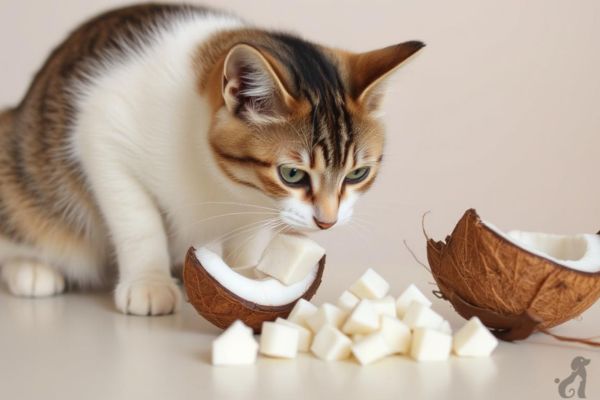
When you give your cat coconut meat, many cats enjoy its taste, even though it is not a necessary part of their diet. The main reason cats enjoy it is that it tastes sweet and creamy, but some cats are not interested in it despite this.
If your cat enjoys eating it, you can give it in small amounts, but be careful with the quantity to avoid digestive problems. The coconut shell and brown skin are tough and can potentially harm your cat, so remove them before giving the coconut to your cat.
Do not give coconut with added sugars or preservatives, and when you start giving your cat coconut for the first time, be sure to contact your veterinarian.
What About Coconut Milk, Water, or Oil?
Cats and Coconut Milk
Soak the chopped coconut meat in water and then strain it. After this process, you will obtain coconut milk, which is sometimes used as a substitute for cow’s milk.
Cat owners often have the misconception that their cats can and should drink milk. Kitties may enjoy milk, but their bodies can’t handle it, causing stomach problems and diarrhea.
If your question is about coconut milk, it is doubtful that your cat will get diarrhea from drinking coconut milk.
When a cat drinks coconut milk, it faces the same diseases that occur from eating coconut meat because coconut milk contains a high amount of fats and calories.
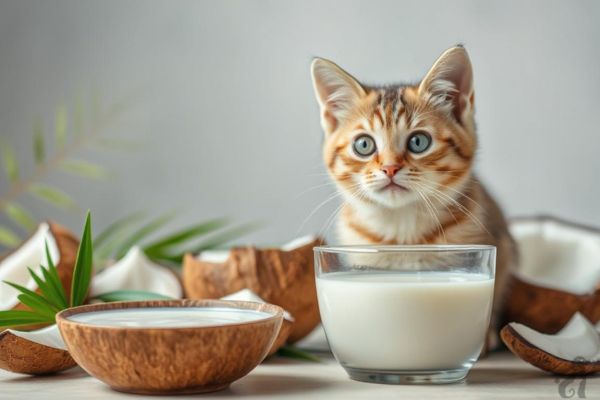
Cats and Coconut Water
Coconut water is a liquid that is found inside green, unripe coconuts. It does not contain much fat, but it contains a large amount of potassium.
For these reasons, coconut water is a popular drink among humans. However, this amount of potassium is harmful to your cats and can cause hyperkalemia.
Since coconut water is high in potassium, if your cat drinks too much coconut water, its blood may become acidic and its heart may stop working properly. Therefore, it is best to avoid offering coconut water to your cats.
Why is Coconut Water Can Be Dangerous?
As we have told you, coconut water is very high in potassium, which can disrupt the electrolyte balance of cats. Coconut water is said to be dangerous for cats because it can strain their kidneys.
Coconut water can upset your cat’s digestive system because it contains natural sugars and minerals, which can cause your cat to experience diarrhea or other health problems. If you want to keep your cat hydrated, prefer using fresh water instead of coconut water.
Cats and Coconut Oil
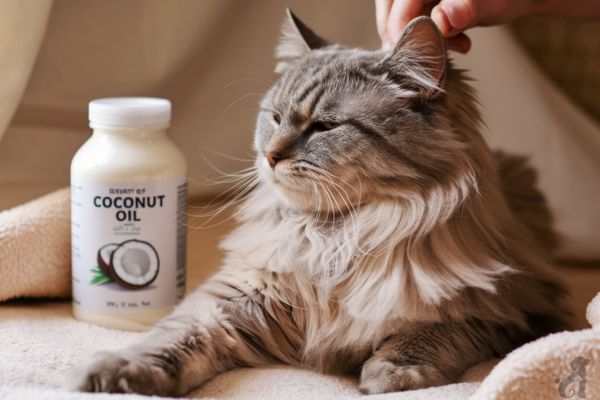
If you want to give your kitty a taste of coconut, you can add a few drops of coconut oil to his wet food to give him a taste of coconut. It’s even better because it can be used in homemade cat treats.
But remember, it has a lot of fat, which can be harmful to your pets. If you don’t want to give your cat coconut oil, you can use it for your cat’s beauty. For example, you can use coconut oil to soften tangles on your cat’s fur and give her a lustrous coat.
Coconut oil may be useful for treating rough or irritated skin on your cat. In addition, the vitamin E and fatty acids in coconut oil can play an important role in softening and moisturizing wounds on a cat’s skin.
How Much Coconut is Safe for Cats?
As I have told you above, coconut meat and coconut oil are very high in fat, which can upset your cat’s digestive system, so keep the amount of both of these things low before offering them to your cat.
It is especially important to be mindful of the amount when you are giving your cat coconut for the first time or if your cat already suffers from digestive upset or pancreatitis.
Therefore, we recommend that when you first give coconut to your cat, the amount should be about the size of a fingernail.
Once you see that your cat is enjoying the coconut and is not having any difficulty digesting it, you can increase the amount, such as up to two thumbs.
You can use this amount when giving your cat coconut meat and coconut oil. Coconut milk and coconut water can make your cat sick, so we do not recommend giving coconut milk and coconut water to your cat.
How Often Can a Cat Eat Coconut?
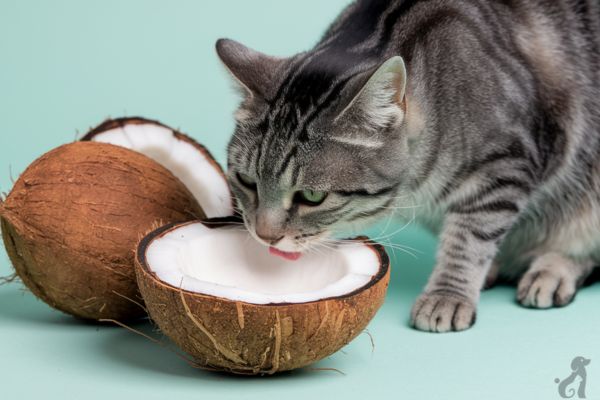
If you are thinking about feeding your cat coconut frequently, do not do so because the fat in it can upset your cat’s stomach or cause pancreatitis. You only need to feed your cat coconut once or twice a week, and that’s enough.
However, when applying coconut oil to your cat’s skin, you don’t need to worry about the amount, but ensure your cat doesn’t lick it off.
Is Coconut Used in Commercial Cat Food?
You can occasionally use coconut in commercial cat foods but add it carefully to keep the food balanced.
Coconuts are usually high in fat and calories, but when you add coconut to your cat’s food, the amount of these nutrients increases, and your cat can eat them without any problems.
But this does not mean that you should add a large amount of coconut to your cat’s other foods, as doing so may cause your cat to face health problems.
Is Coconut Bad for Cats?
- Sensitive Stomachs and Pancreatitis: Cats with pancreatitis and sensitive stomachs should stay away from coconut because it contains fat that can cause vomiting, diarrhea, and stomach pain.
- Moderation is Key: If your cat is healthy and has not had any illness, still be careful about the quantity while giving coconut to your cat so that the cat can digest it well.
- High Potassium in Coconut Water: Coconut water contains a large amount of potassium, which can cause hyperkalemia, and if a cat consumes large amounts of coconut water, its heart rate may slow down or it may even have a heart attack.
- Coconut in Dairy Alternatives: Coconut milk is used as an alternative to milk, such as coconut yogurt, milk, ice cream, and whipped cream. All of these are high in fat and can upset a cat’s stomach.
How to Serve Coconut to Cats?
Most people feed their cats coconuts but don’t know the correct way to offer them coconuts. The correct way is to first take care of the quantity when giving coconuts to your cat, and then offer coconuts to your cat safely.
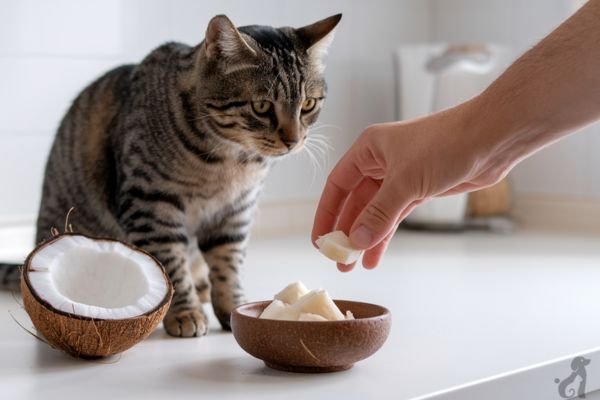
Although cats enjoy eating coconut meat, it should always be offered to them as a treat. When mixing coconut oil into your cat’s food, keep the amount very small because too much can cause your cat to suffer from various diseases, which I have detailed in this article.
By the way, if you keep your cat away from coconut, it is better for its health, but if you ever give coconut to your cat, make sure that the coconut does not contain any additives or sweeteners, as these can be harmful to the health of cats.
Signs of Allergic Reactions
When you add coconut to any cat food or feed it directly, keep a close eye on your cat while it eats coconut. If you notice any signs of an allergy in your cat, such as itching, swelling, or difficulty breathing, stop feeding it coconut and consult your veterinarian immediately.
Also, if the coconut is overly sweet or contains any additives, your cat may experience some allergic symptoms after eating such coconut.
When you give your cat a small amount of coconut, it will be easier for you to understand whether the coconut is having any negative effects on the cat or not.
What should I do if my cat overeats coconut?
If you have fed your cat too much coconut or if he has found coconut somewhere and eaten too much, then monitor your cat in such a situation as he may show signs of digestive upset such as vomiting, diarrhea, or lethargy.
Although coconut is not toxic to cats, the high amount of fat and oil it contains can cause stomach upset in cats. And sometimes, if your cat consumes too much coconut, it may also face diseases like pancreatitis or fatty liver.
However, in a situation where a cat eats too much coconut, make sure that your cat does not become dehydrated. Provide it with as much fresh water as possible and avoid feeding it fatty foods until its digestive system recovers.
Some symptoms should not be ignored at all, for example, your cat’s loss of appetite, persistent vomiting, or unusual behavior.
If your cat has these symptoms, contact your veterinarian immediately because these symptoms can lead to serious diseases such as pancreatitis or liver stress.
If you want to avoid such a situation in the future, it is better to keep your cat on a balanced diet instead of giving him coconut.
We have provided as much information as possible. For further guidance and to ensure the safety of your cat, please consult your veterinarian.
What if my cat eats coconut products with additives like whipped cream or coconut yogurt?
If your cat accidentally eats coconut with additives, like whipped cream or coconut yogurt, look for signs of stomach upset, such as vomiting or diarrhea.
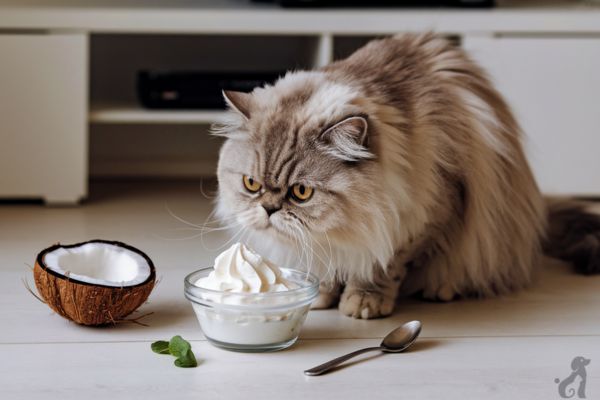
Additives and high fat may not be safe for cats, even in small amounts, as they can cause stomach problems. If your cat’s condition doesn’t improve or gets worse, get advice from your vet.
Creative Ways to Use Coconut Safely for Cats
- Coconut Oil for Skin Care: A small amount of coconut oil can be used on your cat’s dry or irritated skin. It’s a natural way to keep your cat’s skin moisturized and can help with dry paws or flaky skin. Just remember to use it in small amounts.
- Coconut-Based Treats: Add some shredded coconut to chicken or tuna to make safe treats for your cat. Serve small amounts to avoid giving your cat too much fat.
- Coconut Oil for Hairballs: Adding just a bit of coconut oil to your cat’s food can help prevent hairballs. It helps smooth the digestive system and makes it easier for your cat to pass hairballs.
- Coconut Shell Toys: You can make cat toys from empty coconut shells by drilling holes and adding strings. This can keep your cat busy and act as a natural, eco-friendly toy.
- Coconut Milk (Unsweetened): A small amount of unsweetened, plain coconut milk can be given to your cat as an occasional treat. Ensure it’s free of additives or sugar, then check if your cat has any digestive issues.
Conclusion
In this article, I have answered many questions about cats and coconuts, but the answer to your most important question, “Can cats eat coconut?”🥥 is that coconut is not toxic to cats, but it should not be considered an essential part of a cat’s diet.
Although coconut can be given to cats occasionally if it is in its natural form, since it is high in fat and potassium, it can cause digestive problems for the cat.
But before giving the following coconut-related products to cats, you need to know that they can be risky and may upset your cat’s stomach.
- Coconut water
- Coconut milk
- Coconut oil
- Coconut Yogurt
- Coconut Whipped Cream
- Coconut Cake
- Coconut Cream
- Coconut Milk Yogurt
- Coconut Popsicles
- Coconut Ice Cream
- Coconut Macaroons
The gist of the entire article is that you can give coconut to your cat, but it is very important to be careful about the quantity, and even if you do not give coconut to your cat, there is nothing wrong with it.
Whenever you think about giving your cat a new food, first consult your vet about what is good for your cat and what is not.
FAQs
What should I do if my cat accidentally drinks coconut water?
If your cat drinks coconut water, pay attention to its behavior and look for issues like vomiting or diarrhea. Make sure it always has fresh water to drink. Speak to your vet as soon as possible if the symptoms do not improve or become more severe. Stop giving your cat coconut water and feed it its usual food until it feels better.
What signs indicate my cat is allergic to coconut?
Pay attention to symptoms like itching, swelling, redness, throwing up, or diarrhea. This could mean your cat is having an allergic reaction to coconut.
Can coconut oil help with my cat’s coat?
Coconut oil can improve the condition of your cat’s coat. Applying coconut oil to your cat’s fur or adding a little to their food can help make their coat smoother and shinier. The fatty acids in coconut oil help the skin stay moisturized and the fur look healthy.
Can kittens eat coconut?
In my opinion, it’s best to avoid giving coconut to kittens. Although small amounts of coconut meat or oil are not harmful to cats, kittens might have a sensitive stomach. They could suffer from upset stomach, diarrhea, or other digestive issues if they eat coconut.
Is shredded coconut safe for cats?
I think it’s best to avoid giving shredded coconut to cats. Shredded coconut won’t harm your cat, but it can lead to digestive troubles because of the fat and fiber. Shredded coconut can upset a cat’s stomach, leading to problems like vomiting or diarrhea.
What happens if a cat eats coconut?
Coconut could upset a cat’s stomach because it contains fat and fiber. Your cat might feel sick with vomiting, diarrhea, and stomach discomfort. Coconut isn’t toxic to cats, but it’s not a healthy choice, and eating too much can be harmful.
Where can I buy a coconut for my cat?
You can find coconut for your cat at pet stores, online retailers, or health food shops. Pick coconut oil that is virgin or unrefined and made especially for pets, as it’s safer. Always read the label to make sure it has no additives or preservatives.
How much coconut can a cat eat safely?
Coconut is okay for your cat, but it should be a rare treat, limited to a teaspoon of oil or a small bite of the meat. Monitor your cat for any issues, and consult your vet if you’re uncertain.
How does coconut affect cats’ digestion?
The fat and fiber in coconut can lead to stomach issues like vomiting and diarrhea in cats. It may lead to a higher risk of pancreatitis.
What type of coconut is safe for cats?
I suggest that it’s better not to feed cats any kind of coconut. That includes coconut in all forms, like shredded coconut, oil, water, and milk.
Why do cats like coconut?
The smell and texture of coconut could attract cats. Coconut’s scent and taste can attract some cats, mainly if it’s different from what they normally eat. Just because they like it doesn’t mean it’s good for them. The best food for cats is meat, as they are obligate carnivores.
How does coconut affect a cat’s heart?
In moderation, coconut is generally okay for cats and doesn’t affect their hearts. Its high-fat content can lead to weight gain, which might put pressure on the heart over time. Make sure to offer coconut products in moderation and keep a balanced diet to protect your heart.
Why do some cats react poorly to coconut?
Some cats could react badly to coconut because of digestive sensitivities or allergies. The fat and fiber in it can make a cat’s stomach upset, and it could cause skin irritation in some cats. If a cat eats too much coconut, it could be hard for them to process the medium-chain triglycerides (MCTs).

